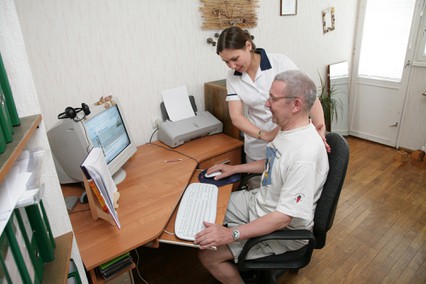Description
Ergotherapists or Occupational Therapists help people improve their ability to perform tasks in their daily living and working environments. They work with individuals who have conditions that are mentally, physically, developmentally, or emotionally disabling.
They also help them to develop, recover, or maintain daily living and work skills. Ergotherapists help clients not only to improve their basic motor functions and reasoning abilities, but also to compensate for permanent loss of function. Their goal is to help clients have independent, productive, and satisfying lives.
Tasks:
1. Plan, organize, and conduct occupational therapy programs in hospital, institutional, or community settings to help rehabilitate those impaired because of illness, injury or psychological or developmental problems
2. Test and evaluate patients' physical and mental abilities and analyze medical data to determine realistic rehabilitation goals for patients
3. Select activities that will help individuals learn work and life-management skills within limits of their mental or physical capabilities
4. Evaluate patients' progress and prepare reports that detail progress
5. Complete and maintain necessary records
6. Train caregivers how to provide for the needs of a patient during and after therapy
7. Recommend changes in patients' work or living environments, consistent with their needs and capabilities
8. Develop and participate in health promotion programs, group activities, or discussions to promote client health
9. Consult with rehabilitation team to select activity programs or coordinate occupational therapy with other therapeutic activities
10. Plan and implement programs and social activities to help patients learn work or school skills and adjust to handicaps
Key skills for Occupational Therapist:
United Kingdom: £30,000 per year
United States of America: $76,940 per year
Australia: AU$ 55,060 per year
Qualifications and training required:
In order to work as Occupational Therapist higher education in occupational therapy, orgotherapy or physical therapy is required. Most courses last for three years (full time) and lead to the award of a degree, but there are also part-time and in-service programmes and an accelerated/shortened routes for graduates.
Ergotherapy training is composed of study and clinical placement. Usually two-thirds will be focused on the theory of occupational therapy and the other third will be spent in fieldwork practice.
A person will study a range of subjects such as biological and behavioural sciences. Projects and self-directed work also form a major part of the course.
Along with the academic qualifications, a person will need to be empathetic and able to build a rapport with a range of people. The role is demanding so a person will need to be resilient. Job placement on the course may be dependent on a personal interview which assesses these qualities.
They also help them to develop, recover, or maintain daily living and work skills. Ergotherapists help clients not only to improve their basic motor functions and reasoning abilities, but also to compensate for permanent loss of function. Their goal is to help clients have independent, productive, and satisfying lives.
Tasks:
1. Plan, organize, and conduct occupational therapy programs in hospital, institutional, or community settings to help rehabilitate those impaired because of illness, injury or psychological or developmental problems
2. Test and evaluate patients' physical and mental abilities and analyze medical data to determine realistic rehabilitation goals for patients
3. Select activities that will help individuals learn work and life-management skills within limits of their mental or physical capabilities
4. Evaluate patients' progress and prepare reports that detail progress
5. Complete and maintain necessary records
6. Train caregivers how to provide for the needs of a patient during and after therapy
7. Recommend changes in patients' work or living environments, consistent with their needs and capabilities
8. Develop and participate in health promotion programs, group activities, or discussions to promote client health
9. Consult with rehabilitation team to select activity programs or coordinate occupational therapy with other therapeutic activities
10. Plan and implement programs and social activities to help patients learn work or school skills and adjust to handicaps
Key skills for Occupational Therapist:
- Strong interpersonal skills
- Active Listening
- Actively looking for ways to help people
- Social Perceptiveness
- Flexibility to changing work environment
- High professional and ethical conduct
United Kingdom: £30,000 per year
United States of America: $76,940 per year
Australia: AU$ 55,060 per year
Qualifications and training required:
In order to work as Occupational Therapist higher education in occupational therapy, orgotherapy or physical therapy is required. Most courses last for three years (full time) and lead to the award of a degree, but there are also part-time and in-service programmes and an accelerated/shortened routes for graduates.
Ergotherapy training is composed of study and clinical placement. Usually two-thirds will be focused on the theory of occupational therapy and the other third will be spent in fieldwork practice.
A person will study a range of subjects such as biological and behavioural sciences. Projects and self-directed work also form a major part of the course.
Along with the academic qualifications, a person will need to be empathetic and able to build a rapport with a range of people. The role is demanding so a person will need to be resilient. Job placement on the course may be dependent on a personal interview which assesses these qualities.
Companies in profession
Best students in profession
Professions you might be interested in
Virtual internship
Company recommended study programs
Jaunķemeri
1 recommendations
Ergoterapija
Rīgas Stradiņa universitāte
- 1 company recommendations
In our portal we are using cookies. Using the portal, you agree to the use of cookies. You can find out more!
Accept
Accept


